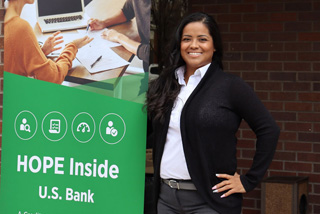
Tips for handling rising costs from an Operation HOPE Financial Wellbeing coach

What to do with your tax refund or bonus

If you’ve ever challenged yourself to eat healthier, you’ve likely heard that it’s easier to reach your goals when you regularly report your progress to someone who will help hold you accountable. When it comes to your finances, the same logic applies, except replace saving calories with saving money.
For many people, the act of explaining your decision to someone else can cause you to stop, rethink and make a better choice. Here are some tips to help you find an accountability partner who will support you throughout your savings journey.
Think about someone you can depend on to meet with you on a regular basis. Friends, family members or your spouse are all great options. You might choose someone who is financially secure or a friend who is just getting started with their own savings journey. The only thing that is essential is to trust your partner.
It can be hard to ask for help, but the outcome of having a partner is proven to be effective. If you’re wondering how to approach potential accountability partners, here’s a script to get you started: “Hi! I'm working on being more mindful about spending and saving money, and I'm looking for someone I trust to help hold me accountable. Can I text/call you to check in on my progress and talk through decisions?” Don’t be afraid to approach a loved one; most people will be happy to help with such an important goal.
However, if it’s too awkward to ask a friend or family member, or there simply isn’t someone to ask, you can always choose to work with a professional, such as a goals coach, to be your accountability partner.
There are advantages to working with a professional. Money and other personal matters can be difficult to discuss with people you know, especially if you’re embarrassed about accumulating debt. Not only are goals coaches experts in their field, but they are also accustomed to helping clients who are facing similar situations. Plus, they have a formal agreement to respect your confidentiality.
U.S. Bank Goals Coaches provide a safe place for clients to discuss and begin working toward their goals. You don’t have to be a U.S. Bank customer to work with a coach.
After setting up a time and place to talk with your accountability partner or coach, consider what topics you would like to discuss, such as managing debt or saving for the future. And make sure you come to the meetings with an open mind and ready to have fun, even when you feel your challenges are overwhelming. A positive mindset can alleviate a lot of stress and will likely help you leave your session feeling empowered.
In order for your accountability partner or goals coach to help, you will need to explain what you’re hoping to accomplish through your meetings, whether it’s slowing your spending habits, saving for a rainy day or managing accumulated debt. There’s no right or wrong answer; go into the relationship being fully open about your goals so your partner can help you be successful.
Think about barriers to saving you’ve experienced in the past. For example, if you’re routinely tempted to shop online sales, ask your partner or coach if you can check in with them before making a purchase to give yourself a cooling off period. You could also ask your partner or coach to check in about recent purchases. Were they necessary, or were they items that will collect dust or just hang in your closet? Transparency is key when talking to your partner about the obstacles you’ve faced, but don’t forget to celebrate the wins you’ve had as well.
It can be a challenge for people not to be too hard on themselves if they don’t reach a goal right away. Your partner can help you recognize how far you’ve come, that everything worth doing takes time, and most importantly, to never give up. If one strategy doesn’t work, you and your partner can brainstorm another way to tackle a goal.”
Reach out to a goals coach today to learn more about how they can help you work toward achieving your goals.
Related content


